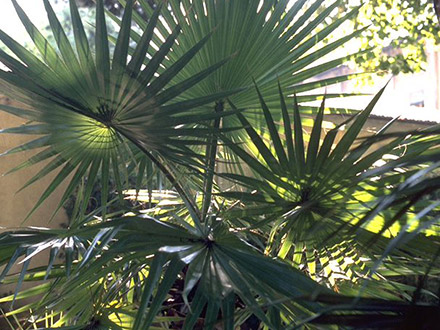Botanical name
Saw Palmetto, Scrub Palmetto - Serenoa repens (W. Bartram) Small [Syn. Sabal serrulata (Michx.) Nutt.]
Family
Palms (Arecaceae)
Information about the plant
The saw palmetto is native to coastal southern North America and its main distribution area is in South Carolina and Florida where it grows on sandy soils in dunes and pine forests; the saw palmetto is also found in tropical Central and South America. It is a short-stemmed bush palm with large fan-shaped, blue-green leaves that are divided in 18 to 24 segments. Their saw-like, fine perforation is their characteristic trait. The 1 to 1.5m long leaf stalks bear this perforation. This was introduced into the palm trees name "Saw Palmetto", the epithet serrata of the synonym, from the Latin "serra" (= saw) and "serratus" (= serrate, serrated) is also used to express this. The epithet repens of the now commonly used botanical name refers to the creeping rhizome of the saw palmetto (Lat. "repens" = creeping). The small flowers are in branched axillary panicles. They bear 3cm long, ovate, one-seeded, nearly black fruit.
Medicinally used parts of plants (herbal drug)
The drug on the market comes from the wild resources of the coastal southern United States and Central America.
Constituents of the herbal drug
Saw palmetto fruits contain fatty oil, free fatty acids and sterols.
Quality of the drug
The quality of the saw palmetto fruits (fructus Sabalis serrulata) is specified in the European Pharmacopoeia (Ph. Eur.).
Medical applications
Recognised medical use
Urination problems in benign prostatic hyperplasia (BPH, also benign Prostatasydrom, BPS) - Stage I-II (Commission E). The effectiveness is proven by clinical studies (approved).
Traditional use
No listing for traditional use (§ 109a)
Herbal drug preparations in finished dosage forms
- dried extract in tablets and capsules
- thick extract in capsules
- alcoholic extracts in drops
- mother tincture in drops
Dosage
Prepared drugs: see package insert;
Tea infusion: The preparation of a tea infusion is not worthwhile because the fat-soluble ingredients of the saw palmetto fruits barely enter into the tea. To ensure the effect in the treatment of benign prostatic hyperplasia (BPH), it is advised that it is used in the form of the prepared finished drug, the dosage is the package leaflet.
Preparation of a tea
N/A
Notes
Since only the symptoms of enlarged prostate are improved, but not the enlargement of the prostate (symptomatic treatment), one needs to regularly seek medical attention. Benign prostatic hyperplasia (BPH) is not relevant to the clinical picture of children and adolescents, so in this regard a warning is unnecessary.
Side effects
There has been occasional stomach discomfort with the ingestion of saw palmetto fruit.
Interactions
Taking preparations made from saw palmetto fruits can increase the effectiveness of the coagulation-inhibiting drugs (Marcurmar, Warfarin, Clopidrogrel); the risk of bleeding in the stomach area while taking aspirin and other painkillers from the group of NSAIDs is increased. Also, the effect of antiandrogens can be reinforced, in hormone replacement therapy with testosterone or other androgens to their therapeutic effect may be weakened.
References
Herbal drug monographs
Commission E, WHO (Vol. 2)
Further literature
Wichtl: Teedrogen und Phytopharmaka, pg. 584
Schilcher: Leitfaden Phytotherapie, pg. 228
Van Wyk: Handbuch der Arzneipflanzen, pg. 299
Kommentar zum Europäischen Arzneibuch (Saw palmetto fruit, no. 1848).


